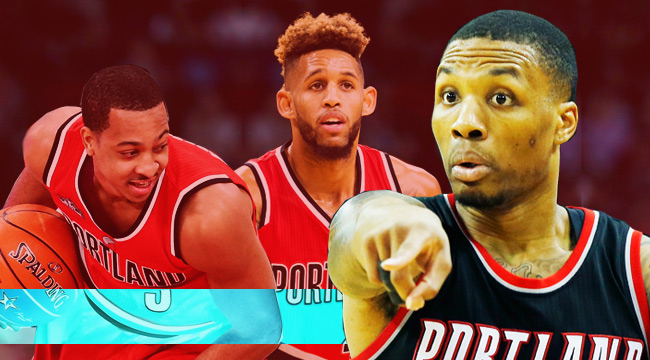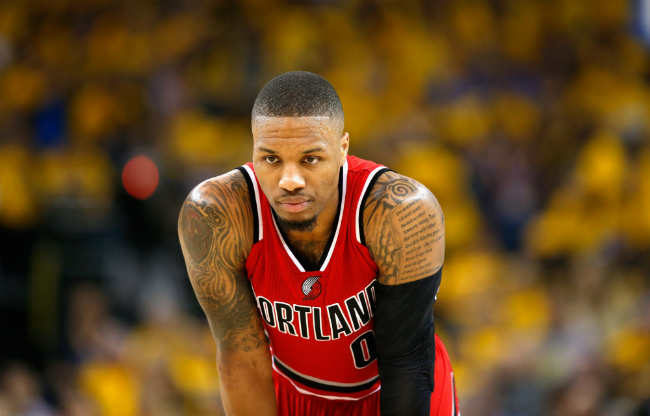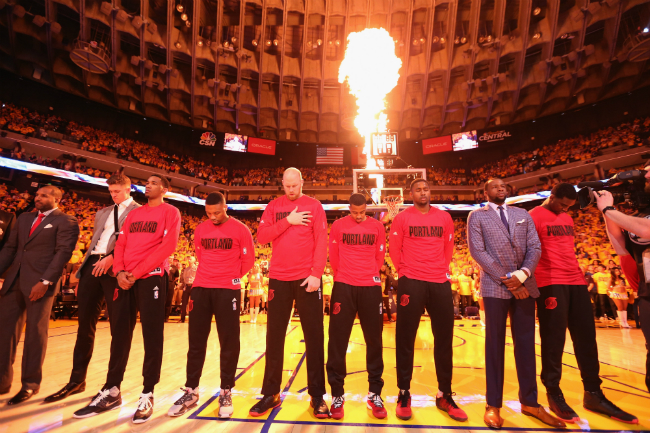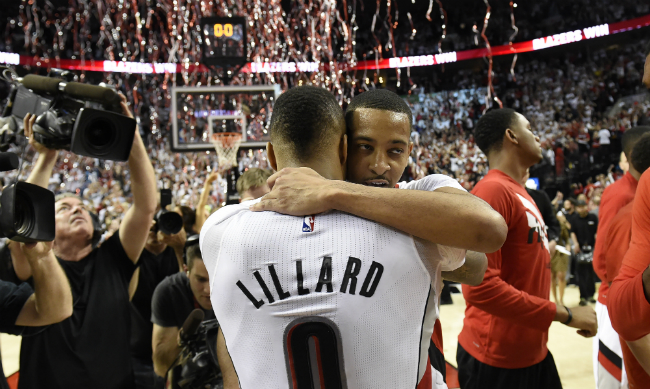
Welcome to Hoop Dreams, a season preview unlike any other you’ll read before the 2016-17 season tips off. The premise is simple. We’ll be providing 30 of these fictional forays because it simply stinks that only one team can win the title each year. The list of contending teams seems to shrink with each campaign, and we wanted to provide something to those fans who only get to dream of Larry O’Brien during the offseason. Before October, every team can win the NBA title. Don’t believe us? Then keep reading. – Ed
Imagine for a moment that – in what was originally supposed to be a rebuilding year – your favorite NBA team rattled off 44 wins en route to a fifth seed in the ultra-competitive Western Conference playoffs. Imagine that a seldom-used, former bench player would come out of nowhere to win the Most Improved Player award. Then imagine that, in an opening-round series against a superior, more experienced team, the fickle basketball gods would send a plague of injuries to hobble that team’s best players and clear a path to a semifinals berth.
Now try to stretch your imagination to its outermost limits and consider the fact that in a second-round matchup, against the best regular-season team in NBA history, said team would be without its best player (i.e. the first ever unanimous league MVP) for much of the series, setting the stage for what could’ve been the greatest postseason upset of all-time.
If that all sounds a little far-fetched, then keep in mind that’s exactly what happened to the Portland Trail Blazers at the end of the 2015-2016 season. It didn’t result in a championship, but the organization rode a wave of goodwill and political capital into an offseason that saw them retain most of the core group that got them there.
It was a tall order to ask for that type of good fortune two years in a row, especially now that the other 29 teams would see them coming a mile away. But head coach Terry Stotts during his tenure had methodically engineered a sophisticated, high-octane, motion offense that’s quite simply demoralizing to try and defend.
So when the Blazers embarked on their 2016-2017 campaign with considerably loftier expectations in tow, they were the only ones who weren’t positively stunned by their 55-win season and a third-place finish in the West. It’d helped that they’d stormed out of the gates to a 17-1 start, thanks in part to a soft early-season schedule and all-around stellar play from their backcourt tandem of Damian Lillard and C.J. McCollum, who picked up right where they left off the year before.

It’d also helped that Allen Crabbe (aka the Crustacean Sensation) had made good on his mammoth $70 million contract, eventually winning the Sixth Man of the Year award, while very nearly taking home the trophy for Most Improved Player while he was at it. He, along with new additions Evan Turner and Festus Ezeli, had proved a deadly combination of instant offense and stifling defense for the Blazers’ second unit.
Other pieces coalesced as well, with Meyers Leonard finally solidifying himself as a prototypical NBA stretch-four, while Al-Farouq Aminu relished his ongoing role as the team’s unofficial heart and soul, the type of do-it-all, 3-and-D swing-man that the basketball cognoscenti salivates for these days.
But as usual, Lillard was the main attraction. With Steph Curry and Klay Thompson divvying up their shots with Kevin Durant, Lillard led the league in made three-pointers for much of the season while converting a blistering 48 percent from long-range. Still, in a conference featuring Curry, Chris Paul, and Russell Westbrook, Lillard narrowly missed the All-Star team once again.
Enraged by that inexplicable snub, he led the Blazers on a 13-game winning streak immediately following the week-long February break, which included a 45-point outburst in a win against Curry and the Warriors, a 37-point game as the Blazers trounced Paul and the Clippers, (and three new rap songs about being underestimated).

The third seed proved fortuitous indeed. They narrowly missed a 4-5 matchup with the Spurs, who’d struggled to find their footing in the early going without Tim Duncan but had come on strong to finish the season and appeared poised for a deep playoff run. Instead, the Blazers got a much more favorable opening-round series against the Rockets, who they dispatched easily in five games.
The Clippers were next, bloodthirsty after last year’s rash of untimely injuries torpedoed Paul’s championship aspirations. But as is the Clippers’ want, they would eventually implode against the Blazers and once again get eliminated before the conference finals, likely ending the Lob City era in Los Angeles.
Their showdown against the mighty, monolithic Warriors would be a bit more complicated, however. Golden State cracked 70 wins for the second year in a row behind a vicious offensive onslaught. But without Andrew Bogut (and Ezeli), their defense had faltered quite a bit. And they still hadn’t quite settled the question of who would take over in a pinch as they were beset by indecisiveness, over-passing, costly turnovers, and untimely shooting droughts.
The Warriors would prove to be their biggest hurdle, one they would eventually leap-frog in six grueling games. Needless to say, the basketball-viewing world outside the greater Portland metropolitan area was more than a little disappointed to be robbed of yet another Finals rematch between the Cavs and Warriors. But out East, the Cavs didn’t hold up their end of the bargain either.
After the Celtics stole Game 1 of the Eastern Conference Finals in Cleveland, they effectively greased the wheels on the LeBron James passive-aggressiveness machine. There were late-night subtweets, purportedly directed at no one in particular yet obviously targeted at certain of the Cavs’ other Big 3. There were vague jabs delivered via the media about his team’s lack of effort and professionalism. Then there was the second half of Game 2 when LeBron attempted just two field goals as the Celtics sprinted to a lopsided victory and a 2-0 series lead.

The Cavs would come storming back, of course, to win the next two in Boston and regain home-court advantage behind otherworldly performances from LeBron, while Kyrie Irving and Kevin Love both finally managed to break out of their slumps. They’d split the next two games, but would then get stunned in Game 7 on their home floor in serendipitous fashion, just as they had stunned the Warriors the year prior, setting off a whole new firestorm around LeBron of “will he or won’t he” stay in Cleveland.
After record-setting numbers the past two seasons, the TV ratings for a Celtics-Blazers Finals fell off a cliff, which only added another chip to the already-Atlas-like shoulders of Lillard, who would somehow find the time to release two more rap tracks with heavy-handed underestimate-me-at-your-own-peril-related themes in the interim between the Conference Finals and the Finals.
Those tracks would prove prophetic as Lillard put on a Finals performance for the ages, leading all players in scoring, assists, and field goal percentage. The Celtics would put up a fight, however, behind gutsy play from Isaiah Thomas and Al Horford, not to mention Avery Bradley, who was an all-around nuisance all series long, but Portland simply had too much firepower in the end.
In six games, the Blazers would give Rip City its first NBA championship since 1977, almost exactly 40 years to the day after Bill Walton and Dr. Jack Ramsay delivered Portland its first title.
And as the victory parade made its unseasonably rainy processional through the streets of downtown Portland, you could see the gravity of the moment on Lillard’s face, the air of pure joy and the enormous pride that comes flooding in when you successfully achieve your goals, along with the ambivalence of knowing that he’d likely shed his underdog status – such a constant source of inspiration and motivation throughout his life – once and for all.






